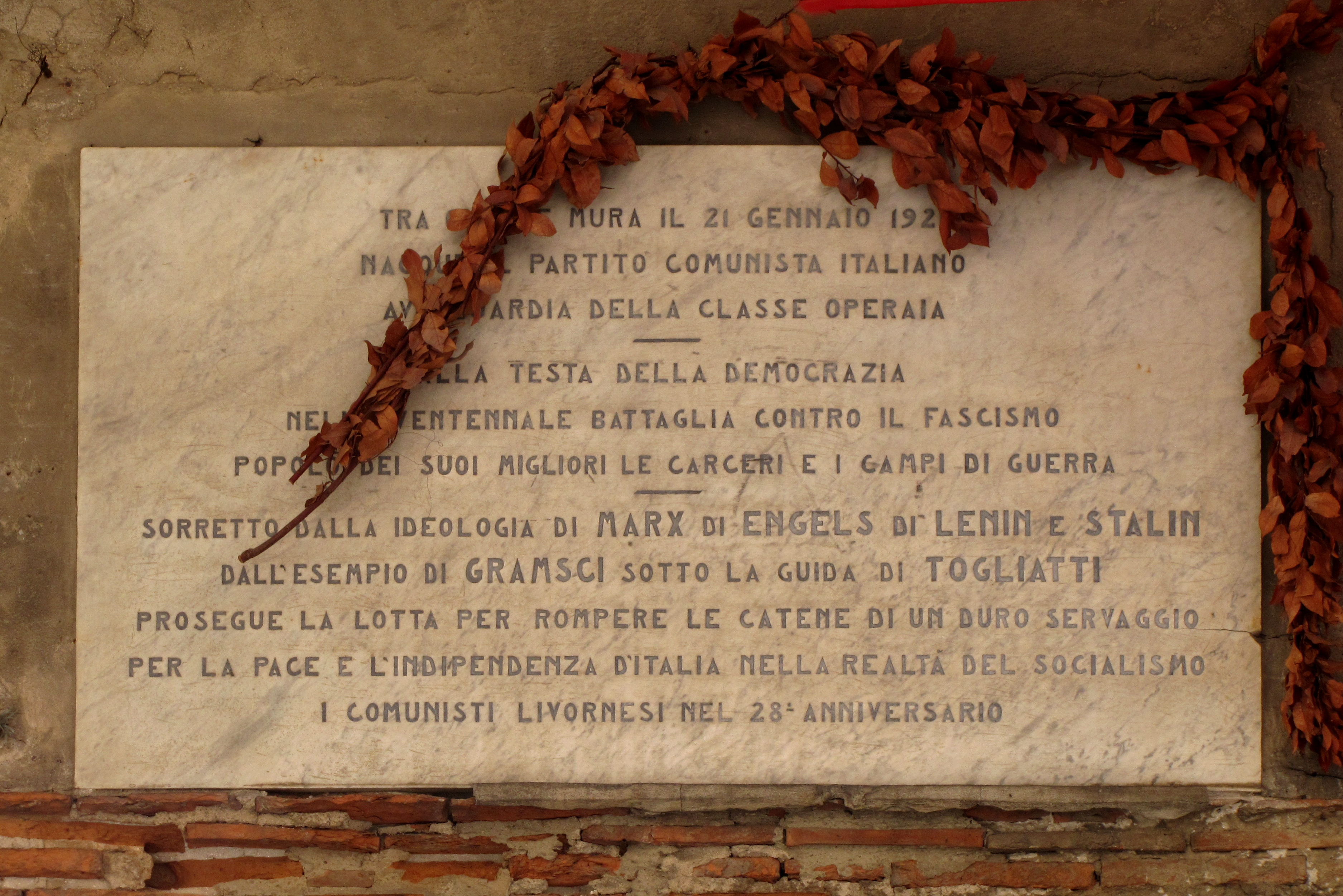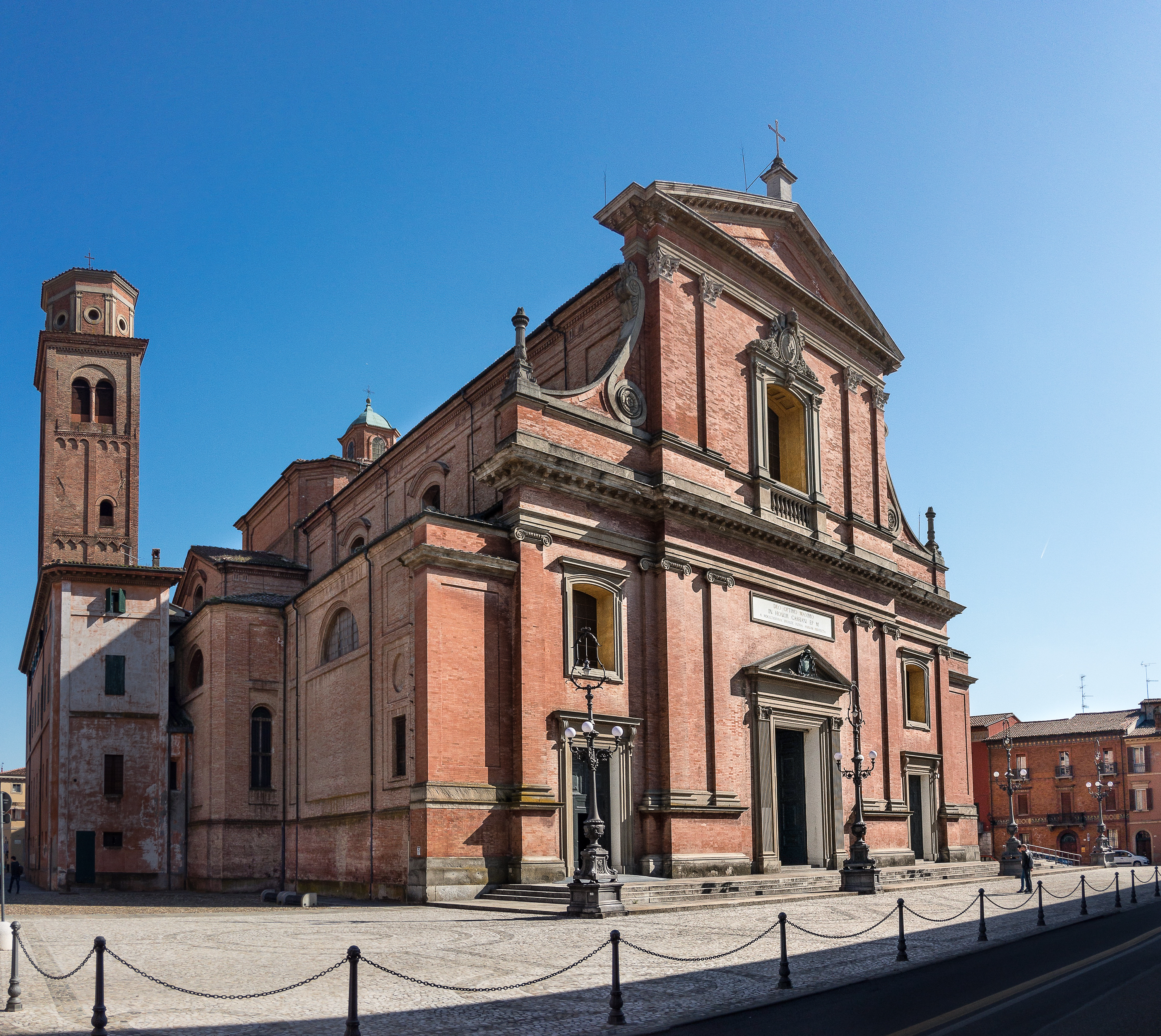|
I Congress Of The Communist Party Of Italy
The I Congress of the Communist Party of Italy was held in Livorno on 21 January 1921, following the split of the communist fraction at the end of the XVII Congress of the Italian Socialist Party (PSI). Background The Italian Socialist Party (PSI) joined the Communist International in 1919. Although the party had adopted left-wing positions against the First World War it nevertheless contained a broad range of political opinions. While the majority of the party was pro-Bolshevik by 1919, a strong reformist right wing remained within the party, led by one if its founders, the leader of the parliamentary group Filippo Turati. Giacinto Menotti Serrati, leader of the majority grouping in the PSI, had led the party into the Comintern but was nevertheless opposed to expelling right wing figures, fearing this would alienate a large section of the party’s supporters. The uneasy internal arrangements of the party were upset by the II Congress of the Comintern in July and August 1920, ... [...More Info...] [...Related Items...] OR: [Wikipedia] [Google] [Baidu] |
Targa PCI Livorno
Targa or TARGA may refer to: Car racing events * Targa Adelaide, in Australia *Targa Canada West, in British Columbia * Targa Florio, in Sicily, Italy, 1906–1977 *Targa Florio Rally, in Sicily, Italy, from 1978 *Targa High Country, in Victoria, Australia *Targa New Zealand * Targa Newfoundland, in Canada *Targa Rignano, in Italy, 1902–1904 * Targa Tasmania, Australia * Targa West, in Western Australia * Targa Wrest Point, in Tasmania, Australia Places * Targa, Kasur, Pakistan * Targa, Sialkot, Pakistan * Targa, Tasmania, Australia * Tarġa Battery, in Malta Other uses * Targa top, or targa, a car body style **Targa, versions of the Porsche 911 * Targa, a range of boats made by Fairline * Targa, a range of boats used by the Metropolitan Police Marine Policing Unit * ''Targa'', unreleased version of video game '' Rendering Ranger: R2'' * Targa, a pen by Sheaffer * Truevision TGA, or TARGA, an image file format * UP Targa, a German paraglider design See also * Targe, ... [...More Info...] [...Related Items...] OR: [Wikipedia] [Google] [Baidu] |
Bruno Fortichiari
Bruno Fortichiari (8 February 1892 – 4 January 1981) was an Italian politician and communist revolutionary. He was among the founders of the Communist Party of Italy (PCd'I) in 1921. Biography Born in Luzzara (Emilia-Romagna), Fortichiari began his activity as a journalist and socialist activist at an early age, and, in the early 1910s, he met Amadeo Bordiga. In December 1912 he was appointed responsible of the Milanese section of the Italian Socialist Party. He was the author of the order that expelled the pro-National Syndicalist and future Fascist ruler Benito Mussolini from the party in 1914, and, in contrast to Mussolini, was among the foremost opponents in first line to protest against the Italian intervention in World War I. After the war he was instrumental to all the events that led to the founding of the PCd'I in Livorno (January 21, 1921). He was a member of the executive committee of the new grouping, together with Bordiga, Ruggero Grieco, Luigi Repossi and Umberto ... [...More Info...] [...Related Items...] OR: [Wikipedia] [Google] [Baidu] |
Bandiera Del Partito Comunista Italiano, 1900-25 Ca
Bandiera is an Italian surname, meaning flag A flag is a piece of fabric (most often rectangular or quadrilateral) with a distinctive design and colours. It is used as a symbol, a signalling device, or for decoration. The term ''flag'' is also used to refer to the graphic design empl .... Notable people with the name include: * Bandiera brothers (died 1844), Italian nationalists during the Risorgimento * Benedetto Bandiera (c. 1560–1634), Italian painter of the early-Baroque period * Bobby Bandiera (born 1953), American rock guitarist, singer and songwriter * Dario Bandiera (born 1970), Italian actor and comedian * Dean Bandiera (1926–2020), Canadian football player * Irma Bandiera (1915–1944) Italian resistance member * Marco Bandiera (born 1984), Italian road bicycle racer * Neri Bandiera (born 1989), Argentine football forward * Oriana Bandiera (born 1971), Italian economist and academic *Daniel “Bundi” Bandiera (also known as “Unc” or “Wassa” ... [...More Info...] [...Related Items...] OR: [Wikipedia] [Google] [Baidu] |
Royal Italian Army
The Royal Italian Army ( it, Regio Esercito, , Royal Army) was the land force of the Kingdom of Italy, established with the proclamation of the Kingdom of Italy. During the 19th century Italy started to unify into one country, and in 1861 Manfredo Fanti signed a decree creating the Army of the Two Sicilies. This newly created army's first task was to defend against the repressive power in southern Italy. The Army of the Two Sicilies combated against criminals and other armies during this time of unification. After the monarchy ended in 1946, the army changed its name to become the modern Italian Army (). Within the Italian Royal Army are the elite mountain military corporals called, the Alpini. The Alpini are the oldest active mountain infantry in the world. Their original mission was to protect and secure Italy's northern mountain border that aligns with France and Austria. This group emerged in World War I when a three-year campaign was fought against the Austro-Hungarian ... [...More Info...] [...Related Items...] OR: [Wikipedia] [Google] [Baidu] |
The Internationale
"The Internationale" (french: "L'Internationale", italic=no, ) is an international anthem used by various communist and socialist groups; currently, it serves as the official anthem of the Communist Party of China. It has been a standard of the socialist movement since the late nineteenth century, when the Second International adopted it as its official anthem. The title arises from the "First International", an alliance of workers which held a congress in 1864. The author of the anthem's lyrics, Eugène Pottier, an anarchist, attended this congress. Pottier's text was later set to an original melody composed by Pierre De Geyter, a Marxist. It is one of the most universally translated anthems in history. It has been adopted as the anthem of the anarchist, communist, socialist, democratic socialist, and social democratic movements. French version The original French lyrics were written in June 1871 by Eugène Pottier (previously a member of the Paris Commune) and were origi ... [...More Info...] [...Related Items...] OR: [Wikipedia] [Google] [Baidu] |
Front Page Of L'Ordine Nuovo Of 22 January 1921 With An Account Of The Birth Of The Communist Party Of Italy
Front may refer to: Arts, entertainment, and media Films * ''The Front'' (1943 film), a 1943 Soviet drama film * '' The Front'', 1976 film Music *The Front (band), an American rock band signed to Columbia Records and active in the 1980s and early 1990s * The Front (Canadian band), a Canadian studio band from the 1980s Periodicals * ''Front'' (magazine), a British men's magazine * ''Front Illustrated Paper'', a publication of the Yugoslav People's Army Television * Front TV, a Toronto broadcast design and branding firm * "The Front" (''The Blacklist''), a 2014 episode of the TV series ''The Blacklist'' * "The Front" (''The Simpsons''), a 1993 episode of the TV series ''The Simpsons'' Military * Front (military), a geographical area where armies are engaged in conflict * Front (military formation), roughly, an army group, especially in eastern Europe Places * Front, California, former name of Brown, California * Front, Piedmont, an Italian municipality * The Front, now p ... [...More Info...] [...Related Items...] OR: [Wikipedia] [Google] [Baidu] |
Mátyás Rákosi
Mátyás Rákosi (; born Mátyás Rosenfeld; 9 March 1892 – 5 February 1971) was a Hungarian politician who was the ''de facto'' leader of Hungary from 1947 to 1956. He served first as of the from 1945 to 1948 and then as General Secretary (later renamed First Secretary) of the |
Khristo Kabakchiev
Khristo Stefanov Kabakchiev ( bg, Христо Стефанов Кабакчиев) (2 January 1878 – 6 October 1940) was a Bulgarian communist politician, revolutionary and historian. Biography Kabakchiev, son of a teacher, was born in Galați, Romania. While studying in Bulgaria and Geneva he encountered socialist ideas, and in 1897 he joined the Bulgarian Workers' Social Democratic Party (BWSDP). When the party split in 1903, Kabachiev followed the more radical Narrow faction of Dimitar Blagoev; from 1905 he was a member of its Central Committee, and in 1908 he was made editor of its central organ as well as elected a deputy to the National Assembly. In 1919, the party was re-organized as the Bulgarian Communist Party (BCP) and joined the Comintern. Kabakchiev was a BCP delegate to the Second and Fourth Congress of the Comintern, held in 1920 and 1922 respectively. After the failed September uprising of 1923, Kabakchiev was arrested and condemned to twelve and a half years ... [...More Info...] [...Related Items...] OR: [Wikipedia] [Google] [Baidu] |
Imola
Imola (; rgn, Jômla or ) is a city and ''comune'' in the Metropolitan City of Bologna, located on the river Santerno, in the Emilia-Romagna region of northern Italy. The city is traditionally considered the western entrance to the historical region Romagna. The city is best-known as the home of the Autodromo Enzo e Dino Ferrari which hosts the Formula One Emilia Romagna Grand Prix and formerly hosted the San Marino Grand Prix (the race was named after the independent nation of San Marino which is around 100 km to the south), and the deaths of Formula One drivers Ayrton Senna and Roland Ratzenberger at the circuit during the 1994 San Marino Grand Prix. The death of Senna (three-times world champion) was an event that shocked the sporting world and led to heightened Formula One safety standards. History The city was anciently called ''Forum Cornelii'', after the Roman dictator L. Cornelius Sulla, who founded it about 82 BC. The city was an agricultural and trading centre, fam ... [...More Info...] [...Related Items...] OR: [Wikipedia] [Google] [Baidu] |
Bukharin
Nikolai Ivanovich Bukharin (russian: Никола́й Ива́нович Буха́рин) ( – 15 March 1938) was a Bolshevik revolutionary, Soviet politician, Marxist philosopher and economist and prolific author on revolutionary theory. As a young man, he spent six years in exile working closely with fellow exiles Vladimir Lenin and Leon Trotsky. After the revolution of February 1917, he returned to Moscow, where his Bolshevik credentials earned him a high rank in the party, and after the October Revolution became editor of their newspaper ''Pravda.'' Within the Bolshevik Party, Bukharin was initially a left communist, but gradually moved to the right from 1921. His strong support for and defence of the New Economic Policy (NEP) eventually saw him lead the Right Opposition. By late 1924, this stance had positioned Bukharin favourably as Joseph Stalin's chief ally, with Bukharin soon elaborating Stalin's new theory and policy of Socialism in One Country. Together, Bukha ... [...More Info...] [...Related Items...] OR: [Wikipedia] [Google] [Baidu] |
Trotsky
Lev Davidovich Bronstein. ( – 21 August 1940), better known as Leon Trotsky; uk, link= no, Лев Давидович Троцький; also transliterated ''Lyev'', ''Trotski'', ''Trotskij'', ''Trockij'' and ''Trotzky''. (), was a Russian Marxist revolutionary, political theorist and politician. Ideologically a Marxist, his developments to the ideology are called Trotskyism. Born to a wealthy Jewish family in Yanovka (now Bereslavka, Ukraine), Trotsky embraced Marxism after moving to Mykolaiv in 1896. In 1898, he was arrested for revolutionary activities and subsequently exiled to Siberia. He escaped from Siberia in 1902 and moved to London, where he befriended Vladimir Lenin. In 1903, he sided with Julius Martov's Mensheviks against Lenin's Bolsheviks during the Russian Social Democratic Labour Party's initial organisational split. Trotsky helped organize the failed 1905 Russian Revolution, Russian Revolution of 1905, after which he was again arrested and exiled to Siberia. ... [...More Info...] [...Related Items...] OR: [Wikipedia] [Google] [Baidu] |


_82.jpg)

